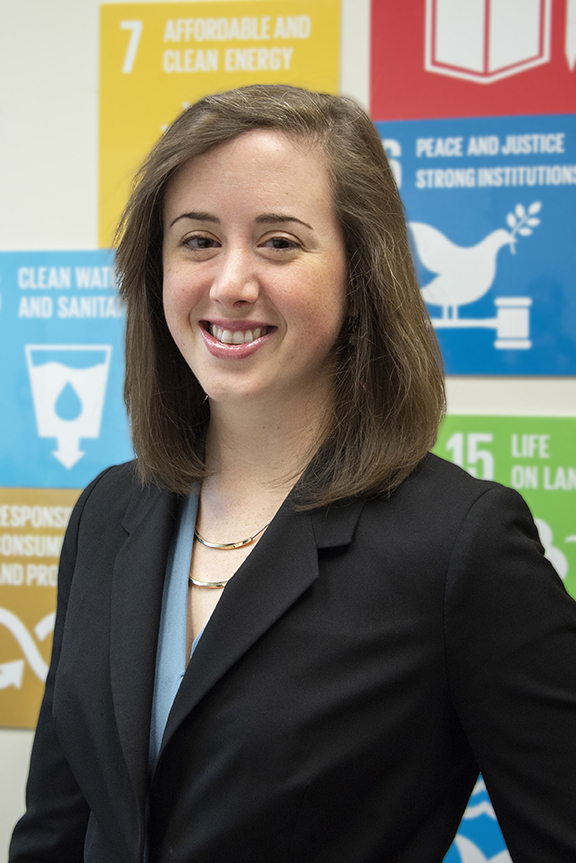The Center is now accepting applications for the next round of Faculty Fellows
December 11, 2018
UNIVERSITY PARK, Pa. – The Center for Security Research and Education (CSRE) is pleased to announce that Caitlin Grady, assistant professor of civil engineering, has been selected as the Center’s inaugural Faculty Fellow. The fellowship will provide funding beginning in January 2019 for Grady’s security-related research.
 “This fellowship will allow me to progress in my work on security research around technical and social barriers to critical infrastructure resilience planning,” Grady said. “It will also allow me to interact with strategic scholars and practitioners, strengthening my ability to integrate strategic security studies into my research portfolio.”
“This fellowship will allow me to progress in my work on security research around technical and social barriers to critical infrastructure resilience planning,” Grady said. “It will also allow me to interact with strategic scholars and practitioners, strengthening my ability to integrate strategic security studies into my research portfolio.”
Through the fellowship, she plans to examine how security threats to U.S. shipping ports affect the flow of commodity goods to U.S. consumers and how ports influence geopolitics throughout the world. Her analysis of shipping ports will deploy a multiscale exploratory inquiry into underlying threats and strategies for resilience of food, energy, and water resources, providing a framework for studying mutual dependency between different types of critical infrastructure. Her research will utilize different methodologies spanning multiple disciplines including civil engineering, industrial engineering, supply chain management, national security, and international conflict mediation and policy assessment.
“We are very excited to have Dr. Grady as the inaugural CSRE Faculty Fellow,” said CSRE Director James W. Houck. “Her research into critical infrastructure security addresses an important national issue with the potential to incorporate insights from a variety of Penn State academic disciplines. She is ideally suited to contribute to CSRE’s mission of interdisciplinary security research and education.”
CSRE is now accepting applications for the next round of Faculty Fellows. The deadline to apply is February 1. CSRE provides funding to support the fellow’s interdisciplinary research on a security-related topic. In addition, the fellow contributes to CSRE’s mission by helping design an event bringing a broad array of Penn State disciplines to bear on a significant challenge to national or global peace and security.
Grady joined the Department of Civil and Environmental Engineering (CEE) and the Rock Ethics Institute in 2017. As an assistant professor of civil engineering, she teaches fluid mechanics, ethics and engineering, and environmental management. She is also an affiliate faculty member with the School of International Affairs. She received her master’s degree in agricultural and biological engineering and her doctorate in civil and environmental engineering with a focus on water resources from Purdue University. She received her bachelor’s degree in science and technology studies from Virginia Tech.
“We are delighted in the CEE Department that Caitlin is the inaugural fellow of the CSRE Faculty Fellows Program,” said Patrick J. Fox, the John A. and Harriette K. Shaw Professor and head of the Department of Civil and Environmental Engineering at Penn State. “The appointment fits very well with her background at the U.S. Department of State and our growing focus on security as related to energy, infrastructure, water, and the environment.”
Prior to arriving at Penn State, Grady worked on scientific and financial analyses for ongoing negotiations for the U.S. Department of State on the Montreal Protocol on Substances that Deplete the Ozone Layer. In this position, she served on the negotiating team for the recently adopted Kigali Amendment to the Montreal Protocol.
Grady was awarded a 2015 Congressional Fellowship on Women and Public Policy and then served as a legislative assistant for Congresswoman Betty McCollum working on issues including water, energy, financial services and civil rights. She was also a post-doctoral researcher at the U.S. Department of Energy working on the water-energy nexus.
CSRE reflects Penn State’s commitment to focusing the full range of interdisciplinary academic endeavor on the threats facing our world today.
The Center has two primary focus areas. First, because security challenges consistently have social, scientific, and technological dimensions, CSRE brings scholars from diverse disciplines together to pursue holistic, interdisciplinary research and solutions. Second, because public understanding enhances security, CSRE works with Penn State faculty and outside experts to educate policy-makers, the media, the public, and Penn State students on the critical security issues of the day.
Visit our Faculty Fellows Program page to learn more and how to apply.
